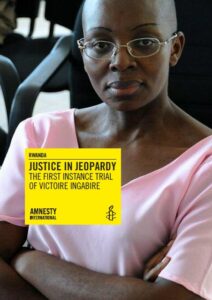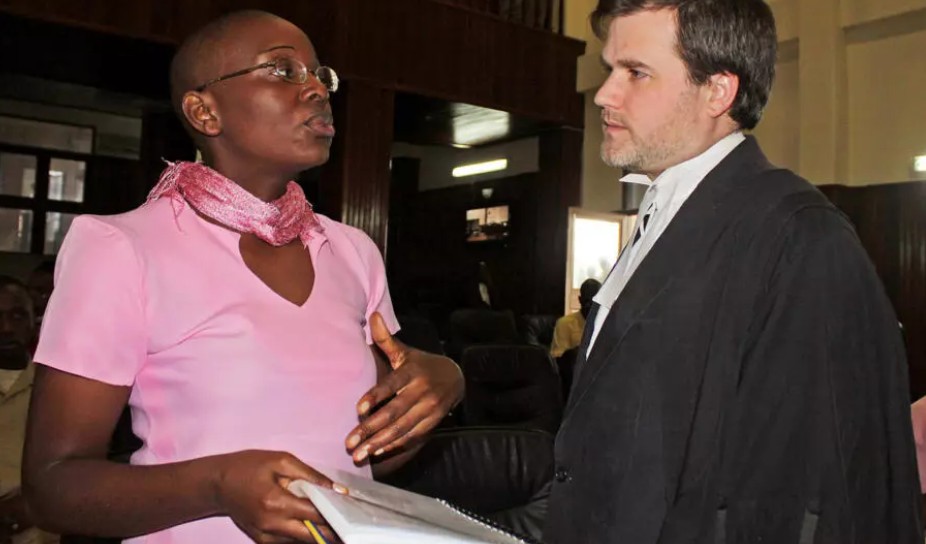Who is Madame Victoire Ingabire?
Madame Victoire Ingabire Umuhoza is a Rwandan politician born in 1968. An economist by training, she is a mother of three children and grandmother of three grandchildren. She founded and led the opposition party to successive authoritarian regimes in her home country, the Unified Democratic Forces (FDU-Inkingi), from 2006 until November 2019, when she established a new political party, DALFA-Umurinzi, which operates solely in Rwanda.

On January 16, 2010, after seventeen years in exile in the Netherlands, she returned to Rwanda to register her party and run in the presidential elections scheduled for August of that year.
As a woman and a mother, she returned to Rwanda accompanied by civilian, unarmed collaborators, driven by a peaceful determination and inspired by the principles of non-violence and peacebuilding. She openly expressed her commitment to inclusion, justice for all, and national dialogue—essential conditions for a transition to a pluralistic democracy that benefits all Rwandans.
Madame Victoire Ingabire Umuhoza’s crime was to call for inclusive dialogue in pursuit of greater justice, the only condition for true reconciliation among Rwandans. Daring to propose an alternative to the ruling dictatorship was perceived as provocation by Paul Kagame and his inner circle.
The magazine Jeune Afrique, citing statements from her party, highlighted that “as a political opposition leader, she denounced the opacity surrounding the responsibilities in Rwanda’s tragedy, as well as the discrimination between genocide victims and those of large-scale massacres committed in Rwanda and the Congo. Since Hutu victims are forgotten and vilified, no reconciliation can be envisioned. In her discourse, she demanded equal opportunities for the living and fair treatment for both Hutu and Tutsi victims—an essential condition for appeasement and reconciliation. This quest for truth and justice sparked outrage among those close to power.”
Regretting that every regime change in Rwanda has, without exception, been carried out through military coups, Madame Ingabire sought a democratic and constitutional transition based on the principles of a state governed by the rule of law, ensuring social justice. Her troubles began as soon as she returned to Kigali, marked by an intense media smear campaign.
Most analysts of Rwanda’s political situation assert that her difficulties began the day she arrived, when, during her visit to the Kigali Genocide Memorial, she requested that those responsible for crimes against Hutus also be prosecuted.
In April 2010, she was arrested, later released, and placed under house arrest. On October 14, 2010, she was arrested again, mistreated by the police, and incarcerated in Kigali’s central prison.
To recognize her courage and commitment, the International Network of Women for Democracy and Peace established the “Victoire Ingabire Umuhoza Prize for Democracy and Peace” in her name. This award is presented annually on International Women’s Day.
Her Trial
In its publication on October 30, 2012, Human Rights Watch stated: “The guilty verdict delivered on October 30, 2012, in the trial against opposition party leader Victoire Ingabire, is the outcome of a trial marred by irregularities and politically motivated charges.”
Through its resolution 2013/2641(RSP), the European Parliament unequivocally condemned the political nature of Victoire Ingabire’s trial. It “strongly condemns the politically motivated nature of the trial, the prosecution of political opponents, and the predetermined outcome of the trial” of Madame Victoire Ingabire Umuhoza.
In its article dated March 25, 2013, Amnesty International stated that it had “gathered information indicating that detainees were subjected to torture and other ill-treatment at Kami Camp. The fact that at least two men tried alongside Victoire Ingabire were incarcerated there for months before incriminating her raises serious concerns and should be investigated.”
The organization further added: “Victoire Ingabire’s trial in the first instance was fraught with irregularities, and international standards were violated.”
Finally, “after reviewing the evidence presented at trial, Amnesty International sees no indication that Victoire Ingabire intended to incite violence or hatred against any ethnic group.” “Amnesty International concluded that observing the trial in the first instance revealed major concerns. Prior to the trial, Rwandan authorities made official statements that raised issues regarding the presumption of innocence, including preliminary conclusions about the probative value of the evidence against her. The charges related to freedom of expression lacked a clear legal basis. Some charges concerning Victoire Ingabire’s statements were based on vague and overly broad legislative texts, particularly laws criminalizing ‘genocide ideology’ as well as ‘discrimination and sectarianism.’ Amnesty International found no call for or incitement to violence or ethnic hatred in the prosecution’s evidence.”
On October 30, 2012, after a trial riddled with serious irregularities, as confirmed by Amnesty International, Madame Victoire Ingabire Umuhoza was sentenced to eight years in prison. The High Court found her guilty of “conspiracy against the authorities through terrorism and war” and “genocide denial.” Strangely, these charges were not included in the indictment presented to the court at the time of her arraignment. Moreover, Madame Victoire was never questioned about these charges—neither by the CID (Criminal Investigation Department), nor the prosecutor’s office, nor in court. To make matters worse, the law on genocide denial, which was used to convict her, was enacted after the alleged offenses and is not retroactive.
On December 13, 2013, the Supreme Court of Kigali increased her sentence to fifteen years in prison—a much harsher punishment than in the first instance.
Having exhausted all legal remedies within Rwandan courts, Madame Victoire Ingabire Umuhoza turned to the African Court on Human and Peoples’ Rights (ACHPR).
After numerous maneuvers, the ACHPR scheduled the trial for March 2017.
For further information on the trial proceedings in Rwanda, please refer to the following documents:
- Human Rights Watch, October 30, 2012 (link)
- European Parliament, Resolution No. 2013/2641(RSP)
- Serge Dupuis, Fondation Jean Jaurès. Rwanda: The Conviction of Victoire Ingabire or National Reconciliation, According to Kigali (NOTE No. 165-Fondation Jean-Jaurès – April 17, 2013)
- Amnesty International. Rwanda: Justice Undermined. The First Instance Trial of Victoire Ingabire (link)
- European Parliament Resolution, October 6, 2016 (link)
Silencing the Defense
From the beginning of the police investigation, the government’s strategy was to intimidate the defense. Madame Victoire Ingabire’s first lawyer, American attorney Peter Erlinder, was arrested and detained. Without U.S. diplomatic intervention, he would likely still be behind bars.
During her first months of imprisonment, Victoire Ingabire Umuhoza wrote a book titled Behind the Four Walls of 1930, recounting her return to Rwanda, her trial, her imprisonment, and her reflections on her conviction.
During her incarceration, she took under her care a little girl named Cynthia, who was imprisoned with her mother. According to the latest information, Cynthia is doing well, and Victoire continues to support her.
Nicknamed the Rwandan Mandela, Victoire Ingabire remains excluded from the electoral process, as her opposition party has not been recognized by the authorities. Furthermore, the sitting president has amended the Constitution, allowing him to remain in power until 2034.
Awards and Recognitions
- 2011: Creation of the Victoire Ingabire Umuhoza Prize for Democracy and Peace by the RifDP
- 2012: Nominated for the Sakharov Prize for Freedom of Thought by the European Parliament
- 2019: Recipient of the Human Rights Award from the Asociación Pro Derechos Humanos de España (APDHE)
The Struggle Continues! Support the Cause of Victoire Ingabire and the Rwandan People
The fight of Victoire Ingabire Umuhoza does not end with her release. After eight years of imprisonment, she was freed on Saturday, September 15, 2018, as part of an early release of more than 2,000 prisoners, a decision made by President Paul Kagame the day before.
Upon her release, she firmly declared:
“There is no reason to stop my political activities because I returned to my country with the goal of fighting for the opening of political space in Rwanda. I was in prison, but for me, prison was just a passage… and I will continue my struggle.”
Her fight is the fight of an entire people—the fight for freedom, justice, and democracy.
Supporting Victoire Ingabire means supporting the rights of the Rwandan people and humanity as a whole in the face of oppression.
What Can You Do?
We must not let dictators impose their rule on the world. Everyone can take action!
Make a donation, no matter the amount: 1 euro, 1 dollar, 1 franc, 1 yen… Every contribution counts because unity is strength.
Financially support the cause via the foundation’s account.
How to Support Financially?
Foundation Account:
Fondation Victoire pour la Paix Bank: BNP PARIBAS FORTIS IBAN: BE56001672531388 BIC Code: GEBABEBB
Together, we can make a difference!



